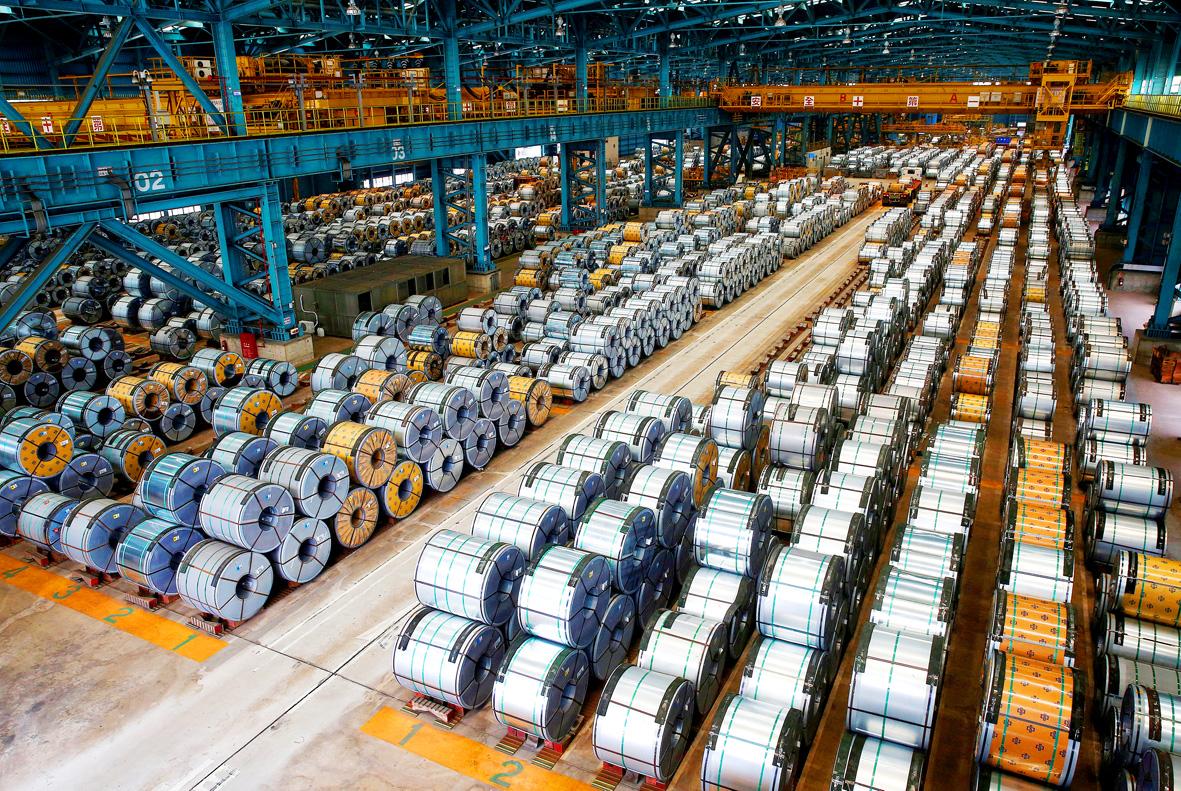China Steel Corp (CSC, 中鋼) is raising steel prices for September delivery by an average of 1.49 percent month-on-month as COVID-19 economic stimulus packages and reopening markets boost demand worldwide.
The price hikes from the nation’s biggest steelmaker came on the heels of a US$20 per tonne increase from its Japanese peers for steel exports and a US$25 per tonne increase from South Korean makers for the local market, CSC said in a statement on Friday last week.
In China, the recovering automotive market and new infrastructure construction projects have raised steel prices to high levels, CSC said.

Photo: Tyrone Siu / Reuters
To accelerate economic recovery, Beijing plans to invest 1.2 trillion yuan (US$171.62 billion) on public infrastructure projects, which would spur demand for steel, the company said.
Flood reconstruction efforts in China have also stimulated steel demand, it said.
“It is clear that the global economy is moving in a positive direction, as the purchasing managers’ indices in Europe, the US, Japan, South Korea, Southeast Asia and Taiwan have all trended up after they started reopening businesses in June,” CSC said.
“Demand for steel is growing,” the company added.
CSC said that global iron ore prices have been hovering at high levels, pushing up manufacturing costs for steelmakers.
The uptrend in iron ore prices is an indicator that the world’s steel industry is recovering, it added.
The Kaohsiung-based steelmaker said it only raised prices mildly, with an aim to divert the risk of order decreases as customers tend to buy more steel overseas when the New Taiwan dollar appreciates against the US dollar, which cuts importers’ purchasing costs.
Over the past month, the NT dollar has risen 0.59 percent to NT$29.593 against the US dollar as of Friday last week, from NT$29.77 on June 15, central bank data showed.
Based on the latest adjustments, prices of hot-rolled steel and cold-rolled steel are to increase NT$300 per tonne, marking the third straight month of price hikes, CSC said.
Hot-rolled and cold-rolled steel are used in auto manufacturing and building construction.
The NT$300 price increase also applies to hot-rolled steel slabs and hot-dipped, zinc-galvanized sheets, which are used in the production of consumer electronics and other high-tech devices such as PCs, the company said.
The price for electro-galvanized sheets is to rise by NT$500 per tonne, the biggest hike among CSC’s steel products.
Over the past seven months, the company has struggled to eke out profits due to slumping prices and shrinking demand.
It posted pretax losses of NT$534.99 million (US$18.08 million) for May, greater than April’s pretax losses of NT$493.16 million.
CSC last month told shareholders that it aimed to return to the black by the end of this year.

UNCERTAINTY: Innolux activated a stringent supply chain management mechanism, as it did during the COVID-19 pandemic, to ensure optimal inventory levels for customers Flat-panel display makers AUO Corp (友達) and Innolux Corp (群創) yesterday said that about 12 to 20 percent of their display business is at risk of potential US tariffs and that they would relocate production or shipment destinations to mitigate the levies’ effects. US tariffs would have a direct impact of US$200 million on AUO’s revenue, company chairman Paul Peng (彭雙浪) told reporters on the sidelines of the Touch Taiwan trade show in Taipei yesterday. That would make up about 12 percent of the company’s overall revenue. To cope with the tariff uncertainty, AUO plans to allocate its production to manufacturing facilities in

TAKING STOCK: A Taiwanese cookware firm in Vietnam urged customers to assess inventory or place orders early so shipments can reach the US while tariffs are paused Taiwanese businesses in Vietnam are exploring alternatives after the White House imposed a 46 percent import duty on Vietnamese goods, following US President Donald Trump’s announcement of “reciprocal” tariffs on the US’ trading partners. Lo Shih-liang (羅世良), chairman of Brico Industry Co (裕茂工業), a Taiwanese company that manufactures cast iron cookware and stove components in Vietnam, said that more than 40 percent of his business was tied to the US market, describing the constant US policy shifts as an emotional roller coaster. “I work during the day and stay up all night watching the news. I’ve been following US news until 3am

COLLABORATION: Given Taiwan’s key position in global supply chains, the US firm is discussing strategies with local partners and clients to deal with global uncertainties Advanced Micro Devices Inc (AMD) yesterday said it is meeting with local ecosystem partners, including Taiwan Semiconductor Manufacturing Co (TSMC, 台積電), to discuss strategies, including long-term manufacturing, to navigate uncertainties such as US tariffs, as Taiwan occupies an important position in global supply chains. AMD chief executive officer Lisa Su (蘇姿丰) told reporters that Taiwan is an important part of the chip designer’s ecosystem and she is discussing with partners and customers in Taiwan to forge strong collaborations on different areas during this critical period. AMD has just become the first artificial-intelligence (AI) server chip customer of TSMC to utilize its advanced

Six years ago, LVMH’s billionaire CEO Bernard Arnault and US President Donald Trump cut the blue ribbon on a factory in rural Texas that would make designer handbags for Louis Vuitton, one of the world’s best-known luxury brands. However, since the high-profile opening, the factory has faced a host of problems limiting production, 11 former Louis Vuitton employees said. The site has consistently ranked among the worst-performing for Louis Vuitton globally, “significantly” underperforming other facilities, said three former Louis Vuitton workers and a senior industry source, who cited internal rankings shared with staff. The plant’s problems — which have not